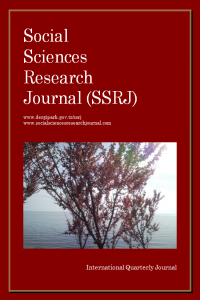ISO 1000 İşletmelerinde Jenerik Stratejilerin Değerlendirilmesi
Jenerik stratejiler, maliyet liderliği stratejisi, farklılaşma stratejisi, odaklanma stratejisi, ISO1000
Evaluation of Generic Strategies At ISO 1000 Enterprises
Generic strategies, cost leadership strategy, differentiation strategy, focus strategy, ISO1000,
___
- Bordean, O. N., Borza, A. and Glaser-Segura, D. (2011). A Comparative Approach of the Generic Strategies Within The Hotel İndustry: Romania Vs. Usa, Management & Marketing, 6(4), 501-514.
- Dess, G. G. And Davis, P. S. (1984). Porter’s Generic Strategies as Determinants of Strategic Group Membership and Organizational Performance, Academy of Management Journal, 27(3), 467-488.
- Dinçer, Ö. (1998). Stratejik Yönetim ve İşletme Politikası, Beta Basım Yayın Dağıtım, İstanbul.
- Güçlü, N. (2003). Stratejik Yönetim, Gazi Üniversitesi Gazi Eğitim Fakültesi Dergisi, 23(2), 61-85.
- Lumpkin, G. T. and Dess, G. G. (2006). The Effect of ‘Simplicity’on the Strategy– Performance Relationship: A Note, Journal of Management Studies, 43(7), 1583-1604.
- Mcguinness, T. and Morgan, R. E. (2005). The Effect of Market and Learning Orientation on Strategy Dynamics: The Contributing Effect of Organisational Change Capability, European Journal of Marketing”, 39(11/12), 1306-1326.
- Murray, A. I. (1988). A Contingency View of Porter's “Generic Strategies”, Academy of Management Review, 13(3), 390-400.
- Mutanga, L. and Minja, D. (2014). Generic Strategies Employed by Food and Beverage Firms in Kenya and Their Effects on Sustainable Competitive Advantage, International Journal of Business and Management Review, 2(6), 1-15.
- Porter, M. E. (1980). Competitive Strategies: Techniques for Analyzing Industries and Competitors, The Free Press, New York.
- Porter, M. E. (1991). Towards a Dynamic Theory of Strateg, Strategic Management Journal, 12(2), 95-117.
- Porter, M. E. (2000), Rekabet Stratejisi: Sektör ve Rakip Analizi Teknikleri, Sistem Yayıncılık, İstanbul.
- Santos-Vijande, M. L., López-Sánchez, J. Á. and Trespalacios, J. A. (2012). How Organizational Learning Affects a Firm’s Flexibility, Competitive Strategy, and Performance, Journal of Business Research, 65(8), 1079-1089.
- Schuler, R. S. and Jackson, S. E. (1987). “Linking Competitive Strategies With Human Resource Management Practices”, The Academy of Management Executive, 207-219.
- Ülgen, H. ve Mirze, S. K. (2007). İşletmelerde Stratejik Yönetim, 3. Baskı, Literatür Yayınları, İstanbul.
- Xuefeng L. Xiaobo W. (2011). Technology Embeddedness, İnnovation Differentiation Strategies and Firm Performance: Evidence From Chinese Manufacturing Firms, Innovation: Management, Policy& Practice, 13(1): 20-35.
- Yamin, S., Mavondo, F., Gunasekaran, A., and Sarros, J. C. (1997). A Study of Competitive Strategy, Organisational İnnovation and Organisational Performance Among Australian Manufacturing Companies, International Journal of Production Economics, 52(1-2), 161-172.
- Yayın Aralığı: Yılda 4 Sayı
- Yayıncı: Denta Florya ADSM Limited Company
Kuram ve Uygulamada Tarihi Çevre Korumaya Bütüncül Bir Yaklaşım
Metal Madencilik Faaliyetleri Arazi Edinim Süreci: Erzincan İli İliç İlçesi, Çöpler Altın Madeni
Paternalistik Liderliğin Etkileşimli Yüzü Ve Örgüt Temelli Özsaygı Arasındaki İlişki
Ayşen Reyhan Wolff, Gizem Demir
BRICT Ülkelerinde Uluslararası Ticaret ve Turizm Talebi Arasındaki Nedensellik İlişkisi
The Importance of the Payment Methods on the Size of the Shadow Economy: Cross-Country Evidence
Hüseyin Safa ÜNAL, Cüneyt KOYUNCU
Katlı Otoparkların Kentsel Yaşama Katkısı Üzerine Bir Araştırma
Osmanlı Devletinde Beledi Hizmetlerde Kurumsallaşma Süreci: Erken Dönem ve Tanzimat Yılları
GÖSTERGEBİLİMSEL ANALİZLE KİRAZIN TADI’NI ANLAMAYA ÇALIŞMAK
ISO 1000 İşletmelerinde Jenerik Stratejilerin Değerlendirilmesi
Türkiye için Dış Ticaret Belirleyenleri: ARDL Sınır Testi Yaklaşımı
Prof.dr.özlem TAŞSEVEN, Prof.dr.nüket SARACEL, Dr.öğr.üyesi Naci YILMAZ
